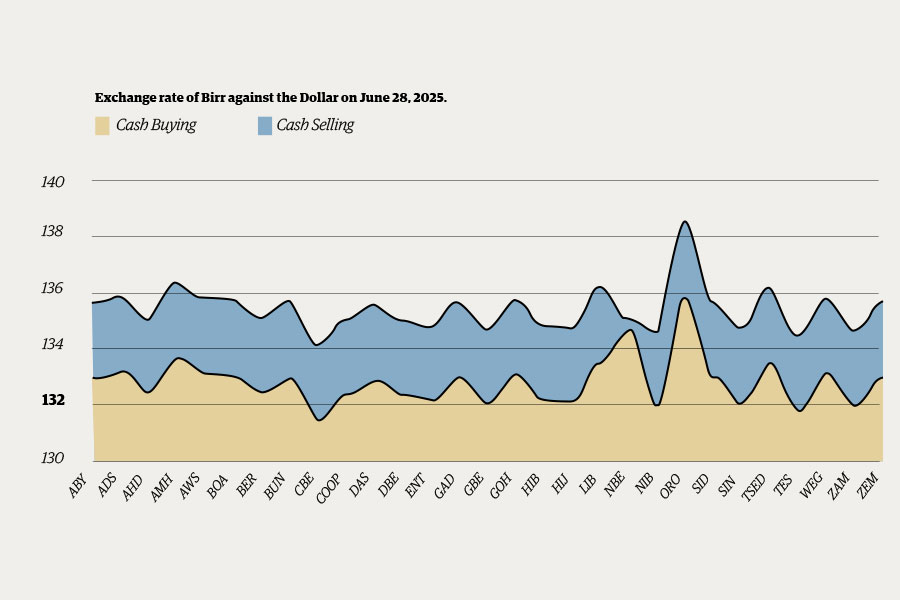
Radar | May 18,2024
Last Thursday, teams from Nifas Silk Lafto and Aqaqi Qaliti districts in Addis Abeba, were warming up at the Ethiopian Youth Sports Academy in front of Imperial Hotel in Bole.
Five days still remain for the Ethiopian Christmas holiday, Gena, which falls on January 7, 2018, and the teams are readying themselves for Ye’gena Chewata, the traditional and indigenous game played between teams of 10, using clubs similar to those used by field hockey players and a puck made of bound leather that each team tries to hit into opposing goalposts.
“I used to play the game with friends while growing up in Ambo during the holiday season,” said Getachew Duguma, coach of the Aqaqi Qality District team and chairperson of the district’s Cultural Sports Committee.
“The elders did not mind that we skipped class. In fact they acted as our referees,” he told Fortune.
“Because the game was played between kids in the neighbourhoods, the rivalry was fierce and injuries were common.”
Traditionally played during Gena, from where it acquired its name, the game has been formalized as part of the All Ethiopian Games.
The two teams were playing against each other to guarantee a place in the quarter-finals of the Addis Abeba City Cultural Sports Tournament. The final game will be played at the Ethiopian Youth Sports Academy on January 6, 2019. The best players will be selected to represent the city in the annual All Ethiopian Games Competition.
Getachew stood by on the sidelines watching his players and giving instructions before the games. The match takes place on a 90m by 45m field, butYe’gena Chewatacan also be played on a 100m by 50m area.
Right at 10am, the referee signaled the start of the game with a whistle blow ant the players enter the field. Five substitutes from each team took their positions on the side lines, and 10 players from each team stood arrayed opposite each other in the middle of the field, crossing clubs to indicate camaraderie.
“It is part of a tradition to show that although they are on opposing teams, they are not enemies and there won’t be bad feelings between each other after the game,” says Yaregal Assefa, coach for the Qirqos district team and president of the Addis Abeba City Cultural Sports Referees Association.
After the referee conducts checks to see all the players are appropriately attired, he starts the game with a second whistle.
The captains of each team stand at the centre of the field facing one another with their playing sticks positioned on either side of the puck, rur, placed on the ground.
The game begins with loud chants and lightly striking each other’s clubs and hopping.
The game is played in keeping with all the traditions of Ye’gena Chewata, a game celebrated for generations. Popularized during the reigns of Tewodros II, Yohannes IV, Menelik II and Haile Seassie, this cultural sporting event was well organised, and winners were lavishly awarded, according to Yaregal.
“The awards included sheep; cotton togas known as Gabi; and horse saddles,” he says.
The favorite to win the game at the Academy is Aqaqi Qality, which is leading by a point 20 minutes into the play, but during the second half, Nifas Silk scores the equalizing goal. Celebrating scores have no grandstanding behaviour as in other games and is simply limited to players striking their clubs with one another.
Ye’gena Chewatalasts for a good hour with a single 10-minute break at halftime. If the regular game results in a draw, the game is extended by 20 additional minutes and a halftime break. If the game is still a tie, the winner is decided by three free shots delivered by each side.
“The skill level and passion for the game by players from the rural parts of the country is much higher as they grew up playing it,” says Ayele Firdaweq, a member of the Yeka district’s team. “Players from urban areas are no match for the rural recruits.”
In his 20s and a Debre Birhan native, Ayele, a truck driver, has been playing for Yeka team and living in Addis Abeba for the last three years.
“I started playing Ye’gena Chewatain my local wereda toward the end of my teenage years,” said Ayele. “I used to take training courses after school before I was chosen to represent my wereda five years in a row.”
Indeed, his claim that the popularity of the game in rural areas is greater than in urban settings is not unfounded. As the Nifas Silk district and Aqaqi Qality district teams are playing, seats reserved for spectators are almost empty.
“Although the number of spectators is below what we want it to be, recent efforts to revitalise the game by the government is commendable,” says Yaregal.
Cultural sports have been included in the educational curriculum and separate competitions for women have been introduced. Ye’gena Chewatais one of the 293 registered traditional and cultural sports and games in the country.
“The cultural dresses, as well as practices leading up to the game, shouldn’t be forgotten either, and the media should be able to help,” says Getachew.
Hiwot Mohammed, a cultural sports instructor who has worked closely in game for 12 years, agrees.
“The media could play a very important role in promoting these games and keeping them relevant by giving them coverage,” says Hiwot. “These games are faced with an existential threat in the urban areas of the country.”
But even if spectators have decreased in number, the competitive spirit has not. Less than 10 minutes into the second half of the Aqaqi Qality and Nifas Silk match, the former takes the lead, but the latter equalises just a few minutes later.
Every time opposition team players come close to the goalpost, which is only three metres wide and one meter high, the goal-keepers positions themselves to be on all fours.
A few minutes before the end of the second half, Aqaqi Qality district team manages to take back the lead, but Nifas Silk district team ties it up once again. The referee blows his whistle to signal the end of the game. Since it is not a knock-out stage game, the teams have no choice but to share a point.
Ethiopian traditional Christmas game, Ye’gena Chewata, is similar to hockey and uses a leather puck and wooden clubs. Goals are set at each end and involve 10 players from each opposing team.
PUBLISHED ON
Jan 05,2019 [ VOL
19 , NO
975]

Radar | May 18,2024

News Analysis | Nov 20,2021

Radar | Oct 26,2019

My Opinion | Oct 02,2021

Radar | May 23,2020

Radar | Sep 24,2022

Money Market Watch | Jun 29,2025

Radar | Oct 27,2024

Radar | Sep 03,2022

Viewpoints | Aug 05,2023

Dec 22 , 2024 . By TIZITA SHEWAFERAW
Charged with transforming colossal state-owned enterprises into modern and competitiv...

Aug 18 , 2024 . By AKSAH ITALO
Although predictable Yonas Zerihun's job in the ride-hailing service is not immune to...

Jul 28 , 2024 . By TIZITA SHEWAFERAW
Unhabitual, perhaps too many, Samuel Gebreyohannes, 38, used to occasionally enjoy a couple of beers at breakfast. However, he recently swit...

Jul 13 , 2024 . By AKSAH ITALO
Investors who rely on tractors, trucks, and field vehicles for commuting, transporting commodities, and f...

Jul 5 , 2025
Six years ago, Ethiopia was the darling of international liberal commentators. A year...

Jun 28 , 2025
Meseret Damtie, the assertive auditor general, has never been shy about naming names...

Jun 21 , 2025
A well-worn adage says, “Budget is not destiny, but it is direction.” Examining t...

Jun 14 , 2025
Yet again, the Horn of Africa is bracing for trouble. A region already frayed by wars...